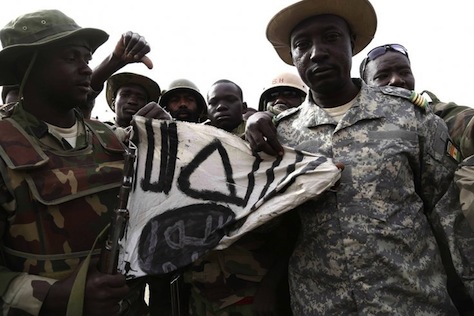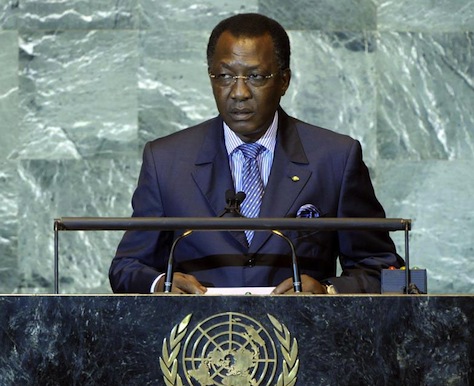 Photo credit to Emmanuel Braun / Reuters.
Photo credit to Emmanuel Braun / Reuters.
Nigeria, after a six-week delay, will elect its president today in its fifth regular set of elections since the return of quasi-civilian rule in 1999.![]()
![]()
The reason that Nigerians are voting on March 28 and not on February 14 was to give the Nigerian army the time to subdue Boko Haram, a northern Islamist insurgent group. Facing a tough fight for reelection and skepticism that he can prevent Africa’s most populous country from fragmenting, what does Nigerian president Goodluck Jonathan have to show for his six-week campaign extension?
Not so much.
* * * * *
RELATED: Six weeks can’t defeat Boko Haram —
or fix Nigerian democracy
RELATED: Nigeria emerges as Africa’s largest economy
* * * * *
Despite exhortions by the Nigerian government that Boko Haram is on the run, there’s evidence that even as military forces take back ground previously lost to insurgents, Boko Haram is changing its tactics — for instance, by increasing the frequency of suicide bombings:
NBC News analyzed JTIC data from the six weeks before and after the day Nigeria postponed the elections. Boko Haram carried out 10 suicide operations between Dec. 28 and Feb. 8, according to the data — which is drawn from a wide spectrum of open-source media reporting. The number of suicide bombings rose to 12 in the six weeks from Feb. 9 to March 23.
What’s more, hours before Nigerians cast their ballots for president, Idriss Déby, the president of neighboring Chad and one of sub-Saharan Africa’s more effective authoritarians, was giving rare interviews to the international media slamming Jonathan’s government. He claimed that the Chadian military was responsible for recent territorial gains, alleging that the Nigerian military is nowhere to be found, leaving Déby (pictured above) and Chadian forces suspended in a quasi-occupation of parts of northern Nigeria:
Mr. Déby’s anger at the Nigerians was barely restrained in the interview. “All we’re doing is standing in place,” Mr. Déby said. “And it is to the advantage of Boko Haram.”
“We’ve been on the terrain for two months, and we haven’t seen a single Nigerian soldier,” he added. “There is a definite deficit of coordination, and a lack of common action.” He said that time was running out for a larger victory against Boko Haram. “Soon it will be rainy season,” he said, explaining that it will be more difficult for troops to maneuver. “This will give Boko Haram a three-month bonus.”
Déby’s actions cut both ways. In one sense, it’s obviously emasculating to the Jonathan government, in particular, that it cannot control security through the entire territory of what is Africa’s largest economy. Like it or not, Déby’s success makes him an increasingly influential stakeholder in Nigerian government. On the other hand, the Chadian soldiers (along with the alleged use of South African and other mercenaries by Jonathan’s government to combat Boko Haram) have made just enough progress to give Jonathan a real shot at holding off his challenger, Muhammadu Buhari, a former military head of state between 1983 and 1985 and a four-time contender for the Nigerian presidency.
Unlike Jonathan, a Christian and a member of the southeastern Ijaw ethnic group who comes from the oil-rich Niger Delta, Buhari is a devout Muslim from the north who has a reputation as a relatively honest politician. That means that Buhari’s promises to end corruption are credible, and his ties to northern leaders and other prominent Nigerians (his backers include former president Olusegun Obasanjo and Ibrahim Badamasi Babangida, who ousted Buhari from power in a 1985 coup) could ease ties between Nigeria’s central government and northern states.
Purported progress in the ensuing six-week period might, however, boost Jonathan’s support enough to remain in office and no challenger since 1999 has ever come close to unseating a sitting president. In fact, Jonathan’s People’s Democratic Party (PDP) has controlled government continuously for 16 years. There are, however, reasons why that could change in this year’s election, including the dismay of many Nigerians at Jonathan’s seeming inability to stop the rise of Boko Haram. He’s also suffered from massive defections from the PDP (including, most notably, Obasanjo) to the All Progressives’ Congress (APC), a coalition of opposition parties that control many of Nigeria’s northern states and its commercial capital, Lagos.
Formed in 2002, shortly after many northern Nigerian states introduced shari’a law (at least in name, if not exactly in fact), Boko Haram now pledges allegiance to the Islamic State (ISIS/ISIL) group that controls much of eastern Syria and western Iraq, has terrorized parts of northeastern Nigeria, causing a deteriorating security crisis in the Sahel and west Africa.
Since 2009, when security forces killed Mohammed Yusuf, its founder, Boko Haram has been led by Abubakar Shekau, who has generally improved the insurgency’s capabilities and enhanced its notoriety. Boko Haram attracted global condemnation last April, when it kidnapped 276 Nigerian schoolgirls. Boko Haram has been a constant security threat in the northeast since Jonathan assumed the presidency in 2010 (when his predecessor, northerner Umaru Yar’Adua, died). By 2011, when Jonathan was running for reelection in his own right, Boko Haram launched a series of suicide bombings in the capital city of Abuja.
If Jonathan wins reelection in today’s voting and serves his full term until 2019, it will mean that southerners will have controlled the Nigerian presidency for 17 out of 20 years — a stark deviation from the tradition of alternating presidential terms. That will only reinforce notions that Nigeria’s north is not receiving its fair share of the country’s oil wealth, a grievance that goes back not only to independence in 1960 but to the era of British control, when colonial administrators lavished much more development on what was then the ‘Southern Protectorate’ than the cultural and religiously distinct ‘Northern Protectorate.’
While Boko Haram isn’t necessarily a insurgency against Jonathan, its roots lie in the north-south divide that Jonathan’s accession to the Nigerian presidency exacerbated. If you were a young, devout Muslim in northern Nigeria, and your reality was grinding poverty as a result of a system established by Western governments, you might be relatively anti-Western as well.
As Nigerians choose today between Jonathan and Buhari, there’s no guarantee that either candidate has the skills necessary to defeat or subjugate Boko Haram. If, in line with prior elections, Jonathan wins reelection today, expect Déby’s influence — and the influence of a growing coalition of African national forces — to continue in northeastern Nigeria. The alternative is that Nigeria could revert back to the status quo that existed between 2011 and 2014, where Boko Haram increasingly makes gains and terrorizes the northeastern population.
A Buhari victory might, itself, bring a second front of political violence if Jonathan or the military establishment refuse to allow a clean transfer of power. After all, Nigeria’s nascent democracy hasn’t yet experienced a transfer from a losing president to a winning challenger. Nevertheless, Buhari would almost certainly calm northern fears about southern dominance, a prerequisite for any long-term stability.
